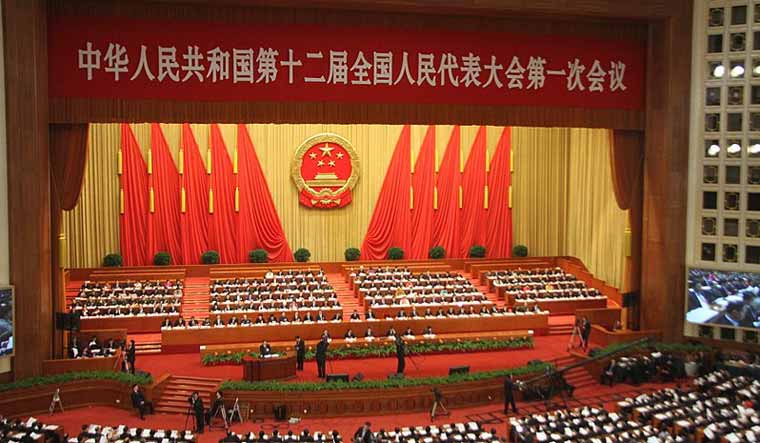China's ruling Communist Party will hold the plenary session, its key leadership meeting, in October during which the party's current hard-line stance towards the pro-democracy protests of Hong Kong, the unending trade war with the US besides further consolidation of power by President Xi Jinping are expected to come up for discussion.
The fourth plenary session of the Communist Party of China (CPC) will be held in October in Beijing, the state-run Xinhua news agency reported, quoting a decision made by the party's Politburo during a meeting held here on Friday.
The meeting was presided over by Xi, who continues to retain a firm grip on power holding the key posts of the general secretary of the CPC, head of the military besides the Presidency, becoming the most powerful leader after party founder Mao Zedong.
Xi, 66, was re-elected for a second five-year tenure last year by China's rubber-stamp parliament, the National People's Congress, (NPC) which also scrapped the two-term rule for the President paving the way for his lifelong tenure.
The Xinhua report did not mention any dates for the Plenary session, a closed-door meeting of the party's roughly 370-member Central Committee, which is also a high powered decision-making body.
October is also the key month for India-China relations as Xi is widely expected to visit India for his second informal summit with Prime Minister Narendra Modi.
The Modi-Xi meeting is expected to spell out the road map for the bilateral ties for the next five years.
The Plenary meet which facilitates the formulation of key strategies and review of policies in the year is taking place after the recent annual gathering of top party leaders at the summer seaside resort of Beidaihe, which paved way for informal consultations.
After the Beidaihe meet, media reports from Hong Kong said that Xi had his way to follow hard-line approach to deal with Hong Kong protests, which continues to make world-wide headlines since June, much to the chagrin of the Chinese leadership.
The result of the Beidaihe meet is the formulation of tough strategies to deal with the unrest in Hong Kong, the Hong Kong-based South China Morning Post reported recently.
"Beijing's attitude towards the crisis has hardened over the past three months, and it is now warning of signs of terrorism in Hong Kong, the report said.
On Friday, top leaders of the pro-democracy protests, which was sparked by the local government's planned legislation to extradite wanted local Hong Kong people for prosecution in the mainland, were arrested.
Chinese Foreign Ministry has declined to react to the reports that China's central government has declined Hong Kong's provincial government's request to withdraw the bill.
China has also sent fresh troops to Hong Kong in what it called a routine rotation of the air, land and maritime forces stationed there even as it massed thousands of paramilitary troops at borders of the former British colony in an ominous show of strength.
Also, the Plenary session would be held after the 13th round of trade talks with the US planned for next month in Washington.
The talks so far have failed to make headway as China continued to resist US President Donald Trump's demand for intrusive verification mechanism to supervise Beijing's promise for the protection of intellectual property rights (IPR) technology transfer and more access to American goods to the Chinese markets.
Trump kicked off the trade war in June last year demanding China to reduce the massive trade deficit which last year climbed to over USD 539 billion. Both the countries slapped additional tariffs on each other's export goods that also resulted in global trade and economic slowdown.
China itself is grappling with the slowdown of its economy which touched a 27-year low of 6.2 per cent in the second quarter of this year.
Observers say the significance of the top decision making bodies of the CPC since the advent of Xi to power in 2012 has declined as he firmly established his stamp of authority doing away with the past system of collective leadership.


